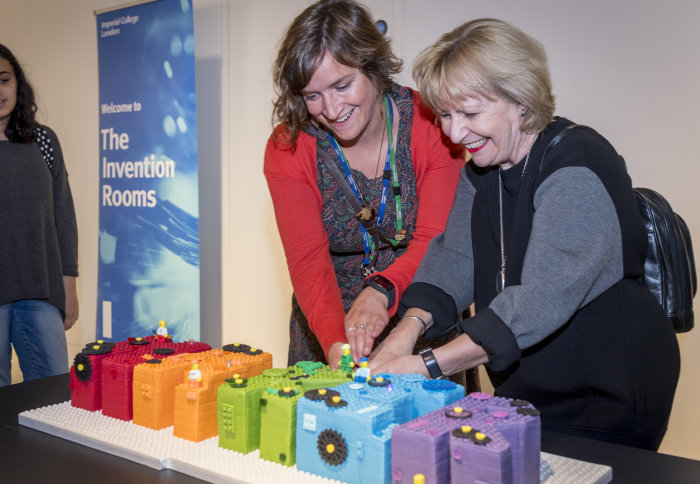Makerspace celebration and weight impact on emotion: News from the College

Here’s a batch of fresh news and announcements from across Imperial.
From a first birthday celebration of Imperial’s Reach Out Makerspace, to a new study looking at body weight’s impact on how we process emotion, here is some quick-read news from across the College.
Makerspace celebration
Imperial’s state-of-the-art educational facility, the Reach Out Makerspace, recently celebrated its first birthday.
Based within The Invention Rooms at Imperial’s White City Campus, the Makerspace provides local young people with free hands-on experience of designing and prototyping.
The celebration featured exhibits from their Maker Challenge Programmes, the Schools Challenge Programme and community activities, as well as prizes and speeches from challenge participants.
Among the projects on display were the Lumi Lamp which monitors breathing and movement to switch off when you sleep, designed by Madeena Hadafmand; trainers with built-in speakers called Sneaker Speaker, created by Cindy Xhebro, and Prince Hussain’s eco-friendly device Harness, which uses kinetic energy created by water running down pipes during rainfall to charge a mobile phone.
Personalised medicine, fire science, and phenomenal plastics

New Scientist Live, a 100-exhibit strong festival of ideas and discoveries for everyone curious about science and why it matters, took place last weekend at Excel London.
Among the exhibits from Imperial were Dr Nuria Oliva-Jorge on bespoke biomaterials for medicine, Imperial’s Hazelab on the science of fire, and Dr Jess Wade on her plastics research.
Dr Oliva-Jorge, from Imperial’s Department of Bioengineering, showcased her work on personalised “glass slipper” medical materials.
She said: “Just like Cinderella’s glass slipper, biomaterials need to fit the patient – they need to be designed and personalised to serve a purpose in a patient-by-patient basis.”
Imperial’s Hazelab, run by Professor Guillermo Rein from the Department of Mechanical Engineering, demonstrated a real fire tornado named Sirocco. Dr Jess Wade, from the Department of Physics, showed her work on conductive plastics that are printed onto flexible electrodes and used in television displays, solar panels and regenerative medicine.
Heart and music
 The connection between music and wellbeing is the focus of a new public survey from the Centre for Performance Science.
The connection between music and wellbeing is the focus of a new public survey from the Centre for Performance Science.
The HEartS music survey aims to explore the relationship in the general population between music activities – such as singing in a choir, learning an instrument or attending concerts – and outcomes for mental health and social wellbeing.
The survey runs as part of a £1million study funded by the Arts and Humanities Research Council (AHRC) examining the health, economic and social impact of the arts on public health.
Take part in the HEartS music survey.
Weight issues linked to emotion

Extremes in body weight can be linked to problems with how we processes emotions, researchers from Brunel University and Imperial suggest.
In a study of 3,274 Finnish adults, they found those who were overweight and underweight were, on average, less able to process emotions, and those with the biggest weight change over the study also had the biggest change in emotion-handling capacity.
The findings, published this week in PLOS One, are from the first large study to confirm the link between BMI and alexithymia – a difficulty in identifying and explaining emotions.
“Eating behaviour is a complex phenomenon with many factors feeding into it,” said lead author, Brunel’s Alex Blakemore. “The good news is that our ability to understand and discuss our emotions is not fixed – it can change over time.”
–
Want to be kept up to date on news at Imperial?
Sign up for our free quick-read daily e-newsletter, Imperial Today.

Article text (excluding photos or graphics) © Imperial College London.
Photos and graphics subject to third party copyright used with permission or © Imperial College London.
Reporter
Andrew Youngson
Communications Division
Deborah Evanson
Communications Division
Joanna Wilson
Communications Division
Ryan O'Hare
Communications Division
Caroline Brogan
Communications Division



